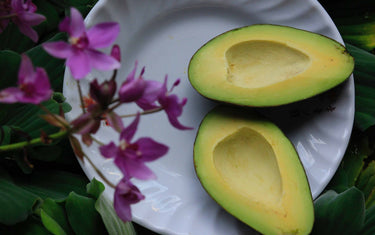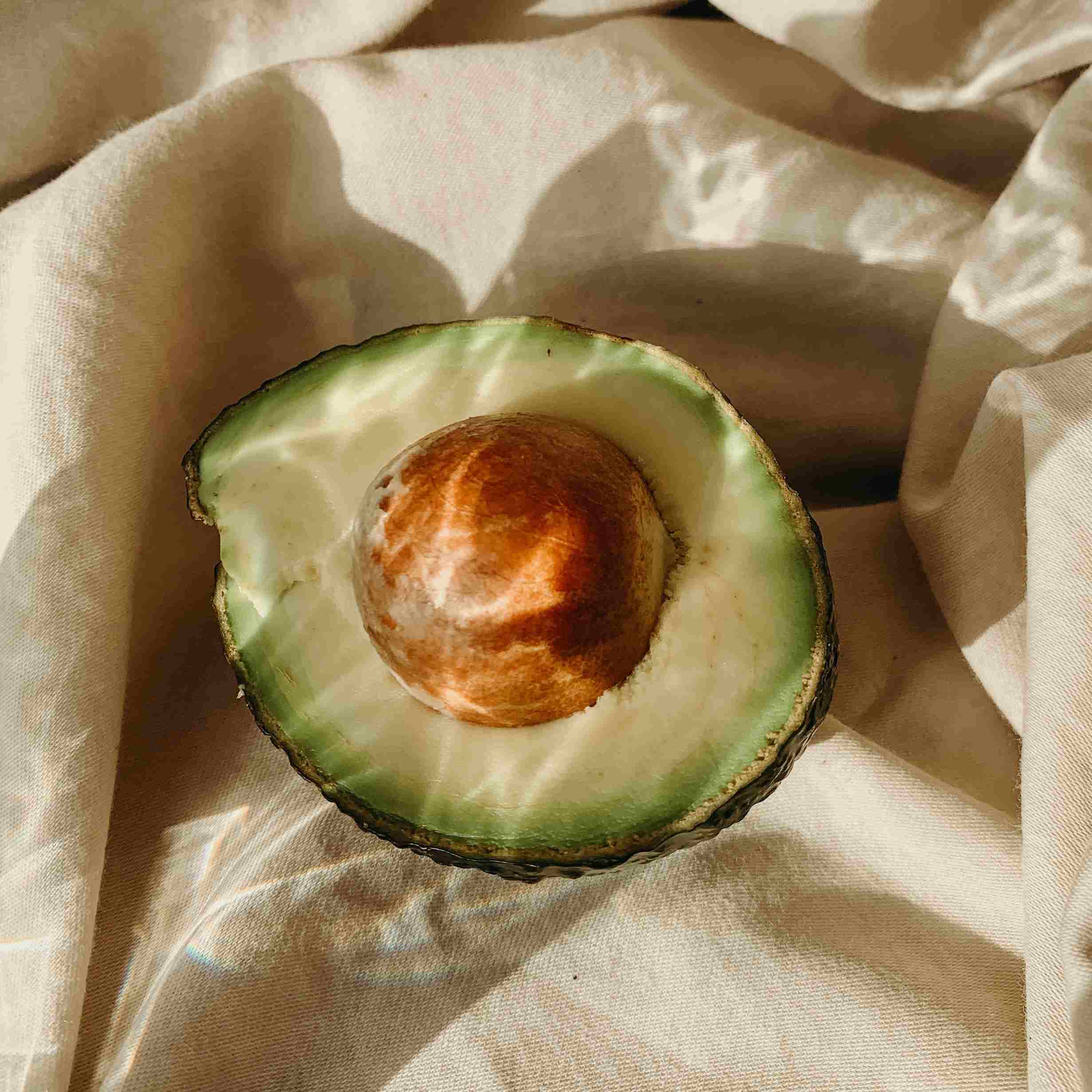7 min read / 6 April 2023 / Laura Garvin Gomez
Avocado Oil Benefits and Uses
This nourishing superfood can do more for our bodies than decorate toast. We're listing all the benefits of avocado oil for your wellness routine right here.

Avocados have been a trendy staple for some years now, featuring on everything from toasted creations to funky socks.
Despite the mass popularity of its origin fruit, avocado oil is still a rarity in the health and wellness world - but many scientists and dermatologists are now believing that should change.
Avocado oil carries a wealth of benefits for the skin, hair, and body, and contains many of the same antioxidants, healthy fats, and essential nutrients as its superstar parent.
If you're curious about including it in your everyday routine, we're detailing everything you need to know about these avocado benefits, how to use avocado oil, and what makes this oil such an up-and-comer.
What is avocado oil?Extracted from the pulp of the avocado fruit - also known as Persea Gratissima - avocado oil is unique form of carrier oil that is rich in lipids, fatty acids, and vitamins. The reason why it's so unique is because, unlike most carrier oils, avocado oil is not extracted from a seed, nut, or kernel. It is also sometimes referred to as a vegetable oil, despite originating from fruit. While its uses are fairly broad in the culinary world, recent attention has been drawn to avocado oil's effects in the beauty industry - particularly in skincare. This is due to its high number of antioxidants that are said to protect the skin from damage. |
What are the health benefits of avocado oil?
Many of us may already be familiar with the health benefits of avocados, but what about their oil? Are the benefits the same?
Actually, yes, and in some cases the oil can be even more powerful than the fruit itself. Some of the most impactful avocado oil benefits include:
- Nourishing and strengthening hair
- Being naturally rich in antioxidants
- Protecting and hydrating the skin
- Reducing the effects of psoriasis
- Reducing the risk of infection and disease
Can you use avocado oil for hair?
Avocado oil is incredibly useful for nourishing the hair and scalp, and may even encourage hair growth with frequent use.
Here are three key avocado oil benefits for hair to keep in mind:
1. It strengthens and moisturises
Avocado oil contains vitamins A, B-15, and E, as well as biotin and a whole host of antioxidants.
These nutrients are all vital for sealing the hair cuticle, which in turn strengthens the hair strands and prevents breakage caused by everyday activities like brushing and washing.
Avocado oil can also deeply moisturise the hair by penetrating the hair shaft and encouraging hydration. This effect is thanks to the oil's high levels of oleic acid and monosaturated fats.
2. It nourishes the scalp
You can't achieve healthy hair without a healthy scalp, and avocado oil is a key player for the removal of irritation and dandruff within these areas.
Topical application of the oil can stimulate blood flow as well as unblock clogged follicles, leading to new, stronger hair strands coming through.
3. It may encourage hair growth
Remember the biotin we mentioned earlier? Biotin is a member of the vitamin B family, which is famous for its effects toward hair growth, thickness, and health.
While research on avocado for hair growth is still limited, combining the oil with a proven stimulant like rosemary oil could potentially lead to positive results.
Learn more about the benefits of avocado oil for hair.

Is avocado oil rich in antioxidants?
Avocado oil is a great source of antioxidants, which are extremely important for keeping our bodies in working order.
Free radicals, also known as "toxins", can cause damage to our cells if there are not enough antioxidants in the body to fight them off. This can lead to more serious complications like oxidative stress, cardiovascular decline, and increased signs of aging if left untreated.
Thankfully, the use of avocado oil can fight these nasty toxins off, leading to healthier bodies and more youthful complexions. They can also help keep our hair and skin protected from external irritants like sunlight and pollution.
What are the avocado oil benefits for skin?
Just as with our locks, avocado oil can encourage great-looking skin too. We're listed three of the best reasons to use avocado oil for skin.
1. Minimises inflammation
Despite having a mid-wight comedogenic rating of 3, avocado oil is great for all skin types - including acne-prone skin.
That's because the oil is highly anti-inflammatory, so can reduce signs of redness and irritation without clogging pores in the process.
2. Maintains hydration
Avocado oil, like many carrier oils, is a master at hydrating our skin. Its also an emollient, which means it can successfully trap moisture into the skin and prevent dryness.
On top of this, avocado oil has occlusive properties which can leave skin feeling soft, supple, and smooth.
3. May help boost collagen levels
Though there's little evidence to suggest avocado oil can boost collagen on its own, research has shown that its use could help balance collagen levels and prevent further damage.
It does this by intercepting the pathways responsible for collagen breakdown, as well as inhibiting damage caused by certain enzymes, like lysyl oxidase. Use of avocado oil could therefore lead to a more even, youthful complexion.
Learn more about the benefits of avocado oil for skin.
Is avocado oil good for treating psoriasis?
Psoriasis is an auto-immune disorder that causes itchy red patches across various areas of the skin - like the elbows, scalp, and legs.
While there is no current cure for psoriasis, carrier oils like avocado are popular for managing symptoms and soothing inflammation.
In fact, one 2017 study noted the effects of an avocado oil-based cream on sufferers of the condition, and confirmed that its use could improve symptoms.
A similar 2001 study also noted its success, stating that avocado oil may even be able to heal and treat the condition with regular use.
Can avocado oil reduce infections and disease?
Avocado oil made up of 70% oleic acid - a monosaturated omega 9 healthy fat that has been linked to the reduction of heart disease and dementia in later life.
A 2014 study confirmed that use of avocado oil could reduce bad cholesterol (LDL) in the body without affecting good cholesterol levels (HDL).
Avocado oil has also been linked to the promotion of wound healing, thanks to its high levels of monosaturated fatty acids (like oleic and linoleic acid). This has make it an ideal choice for clearing blemish-prone skin and reducing the risk of infection.

How to use avocado oil
1. Haircare
There are a couple of powerful methods you could adopt when including avocado oil in your haircare routine:
- Use it as a styling serum. Apply a small amount of oil to dry hair with your fingertips just before heading out the door. Start from the mid-shaft through to the ends.
- Give yourself a nourishing scalp massage. Wet your hair in the shower and dispense around a teaspoon of avocado oil onto your palm. Massage the oil into your scalp and leave for 2 minutes before rinsing.
Avocado oil is suitable for all hair types, including thick and high-density hair, so feel free to incorporate it however you see fit as a way to hydrate and replenish your locks.
2. Skincare
The uses of avocado oil for skin are fairly endless - ranging from helping to treat conditions like psoriasis and acne to moisturising chapped or dull skin.
Here's a good basic recipe to get you started:
- Wash your face with warm water and pat dry. This will help open up your pores before application.
- Dispense a pea-sized amount of avocado oil onto your palm.
- Warm the oil with your hands and apply in gentle circular motions across your face and body.
- Once the oil has mostly absorbed, pat off any excess with a clean towel or cloth and continue with your routine as normal.
You can also try making your own face mask using avocado oil, raw avocados, and some honey.
If you're using the oil combat breakouts, try combining it with essential oils like tea tree oil to make the most out of the all-natural effects.
3. Cooking
Avocado oil is ideal for use in cooking, thanks to its high smoke point which allows it to easily fry and grill certain foods.
It's also great for drizzling on top of salads, using as a marinate, or sprinkling into homemade dips like mayonnaise and hummus.
Avocado oil can also help you absorb the fatty acids present in your foods, giving you a greater source of nutrients.
It's important to note, however, that not all avocado oils are food grade, and therefore should only be used for external purposes like application to the skin or hair.
Frequently Asked Questions
Are there any risks to using avocado oil?
Avocado oil is a very safe oil - only posing risks to those with allergies or intolerances to the fruit. That being said, it's worth doing a patch test before use to ensure its safety for you.
Will avocado oil clog my pores?
No - avocado oil is considered non-comedogenic, despite having a medium score, thanks to its anti-inflammatory effects. This makes the oil safe for all skin types.
Is avocado oil better for you than olive oil?
Avocado oil and olive oil are both excellent sources of monosaturated fats, and avocado oil is considered the better choice of the two for topical application. But olive oil is said to have slightly greater nutrients when it comes to cooking.

Avocado oil is a truly wonderful asset to our health and wellness routines - no matter how we choose to use it and where.
While cooking applications require a certain type of avocado oil, all types are suitable for nourishing the skin and hair, and can produce highly impactful effects with regular application.









